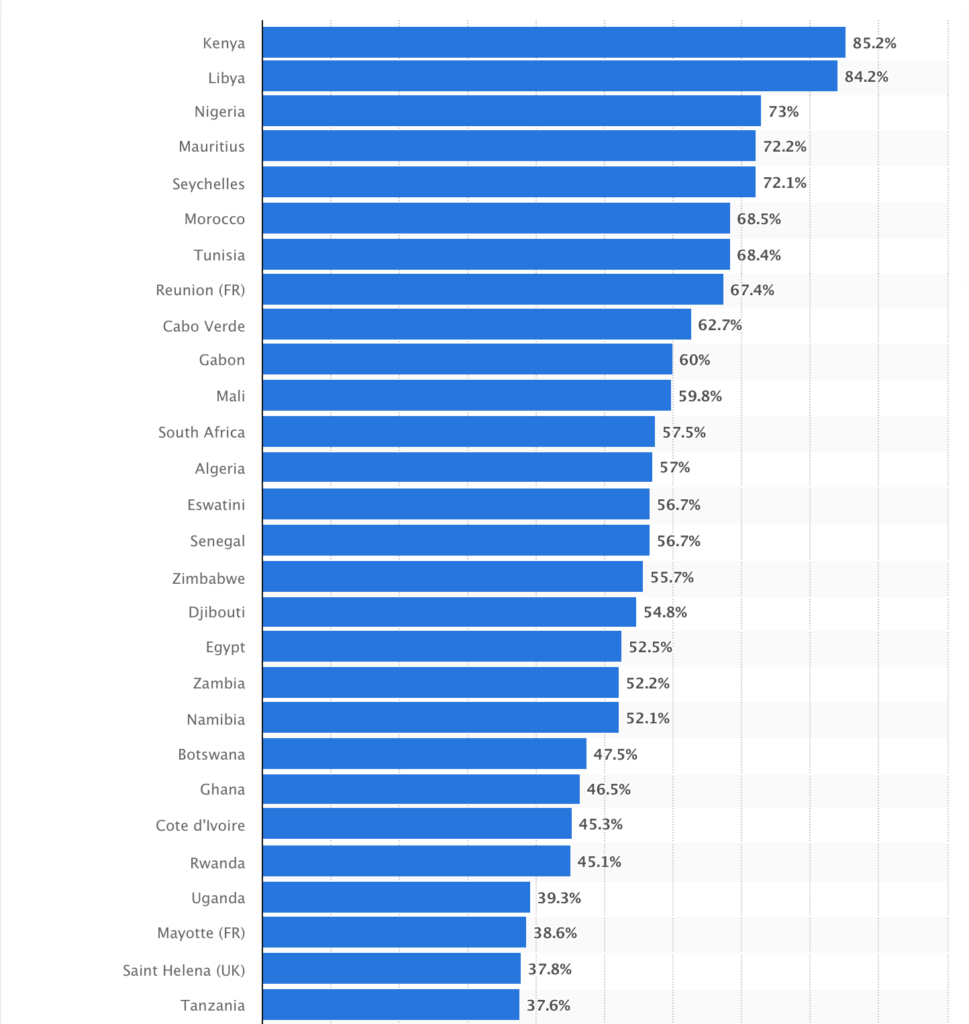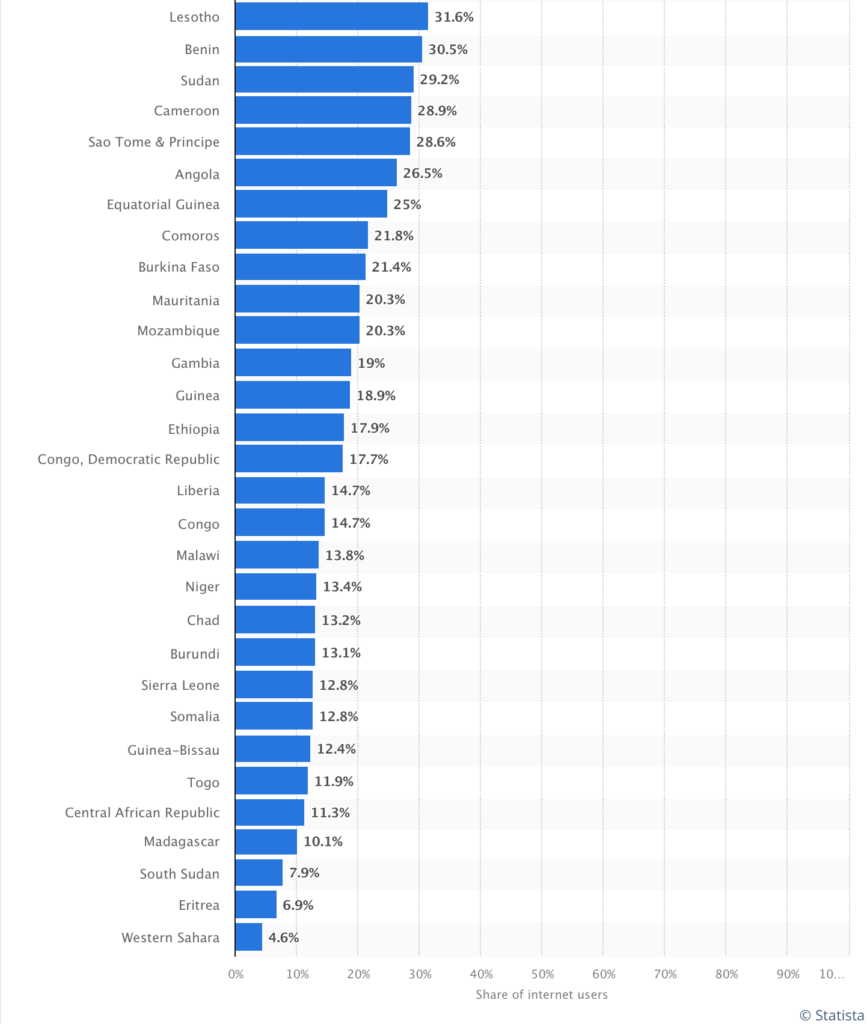A key question asked about our online training is – ‘is my internet connection strong enough to participate?’. Since Africa is the least connected continent, we thought we’d look at internet connections in Africa to consider this question.
There are two possible answers to the question: a narrow and a broad one.
The narrower answer is: if you are based in Africa, we have made it easy to check whether your bandwidth is sufficient to take a training with us – just register for a free Crucial Safety course to test whether you are able to download the documents and to stream the video and audio included in the free course. If you are able to do this for one course you should be able to do it for any of our other courses, whether free or ‘paid-for’. If you are taking a multi-week paid-for course you will also need to be able to stream Zoom or a similar tele-conferencing platform so you can take part in the ‘social learning’ aspects to the course where you explore and discuss weekly topics with peers.
If you want to check whether your bandwidth is sufficient right now you can visit our Online Course Availablepage, where you can sign up for a free course. All courses can be accessed by either computer or mobile phone.
The broader answer to the question is more complex and depends in which country you are based. Let’s have a look at some current statistics for internet users in Africa:
Share of internet users in Africa as of December 2020:

The statistics show that some countries in Africa – Kenya, Libya, Nigeria – have a high number of internet users, whereas (below) South Sudan, Eritrea and Western Sahara do not.

The broad statistics hide a number of important distinctions: in all countries, younger, wealthier and better educated Africans are more likely to have access to the internet – and these are often the demographics who work for humanitarian and development organisations. So the staff of these organisations are likely to have access to the internet at a significantly higher rate than shown in the diagram, either at home, at the office, or both.
Furthermore, staff based in a capital city or regional town are more likely to have internet access than those based in rural areas – again meaning that many of the staff of aid and development agencies have better access to the internet than the beneficiaries they work for. For example, when I was based in South Sudan a few years ago I had quite reasonable internet access in Juba, the capital city. There was, at the time, very little internet coverage outside Juba.
The graph says nothing about the reliability or rate of growth of internet access in Africa. Continent-wide both of these are improving dramatically year on year, so areas that do not currently have reliable access may well do so within the next 5 years. The statistics in the graph above come from December 2020, so will have improved since that date. To go back to the Juba example, I am currently running an online crisis management exercise involving a Crisis Management Team in Europe and an Incident Management Team in Juba. The internet connection of the team in Juba is much faster and more stable than it was when I worked there, and South Sudanese staff tell me it’s now possible to access the internet in most towns across the country.
Neither does the graph say anything about the speed of connectivity on the continent. Connectivity speeds vary significantly across African countries depending on infrastructure and investment, and on average are relatively lower than on other continents. But this does not necessarily rule out successfully taking part in online training. Like reliability, connectivity speeds are also increasing rapidly, and broadband is starting to spread into urban areas across the continent. According to the Fair Internet Report, in the twelve months between 2019 and 2020 internet speeds increased dramatically in a number of African countries, including the following:
- Tanzania 300% faster
- Mozambique 200% faster
- Uganda 150% faster
- Egypt 125% faster
- Somalia 120% faster
- Ghana 100% faster
- Nigeria 65% faster
- South Africa 65% faster
- Ethiopia 50% faster
When developing Crucial Safety trainings we take both bandwidth and device considerations into account. The documents and audio used in the trainings require only a low bandwidth to download or stream. Video content is created in shortish chunks to allow it to stream more easily. And if required, videos can be viewed at a reduced definition to suit a lower bandwidth. Using a reduced definition has minimal impact on the quality of the videos, which remain easy to engage with. The materials can be accessed on computers, tablets and mobile phones.
To summarise, it’s quite possible for staff in Africa to take Crucial Safety trainings. Some people will find it easier than others to access trainings, but with rapid technological and infrastructure advances more and more will be able to do so in the coming months and years. There are plenty of telecom providers in Africa – both home-grown and international, and supported by African governments – who are racing to connect hundreds of millions of potential African users to either the standard internet or to broadband. These companies see the development benefits of the internet, and they also see the potential to make vast profits. It’s unlikely that Africa will remain in a backwater of the internet for much longer with so much money to be made.
Let me finish by going back to my narrower answer to the question. If you are based in Africa and wondering whether you can take a Crucial Safety course, the easiest thing to do is check – it’s very easy to do. Sign up to a free course and test whether your internet connection is sufficient and the device you are using is effective. You have nothing to lose – and perhaps quite a lot to gain – by trying!








